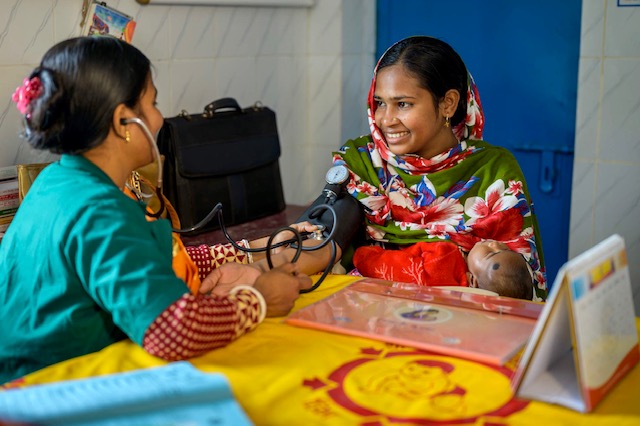According to the United Nations, more than 5,500 women die in pregnancy and childbirth each year in Bangladesh. That’s 8 percent of total deaths among women of childbearing age, and many of these deaths are preventable with the right interventions.
To make matters worse, 32 out of every 1,000 children born in Bangladesh will die before their fifth birthday. Women and children in southwest Bangladesh face many risks that increase their vulnerability, including unsafe water, sanitation, and hygiene conditions, and reduced access to proper healthcare facilities and information.
But Nobo Jatra — a five-year program funded by USAID and implemented by World Vision and Winrock International in partnership with the World Food Program and the government of Bangladesh — is starting to change all of that.
At the Chunkuri Community Clinic, mothers can now receive thorough pre- and postnatal care in a clean, up-to-date government facility, rather than having to pay more and travel farther to a private clinic. Additionally, their newborns are now monitored during their first few years to ensure they’re growing and thriving. Many of the mothers receive regular household visits from one of Nobo Jatra’s community health organizers, who help the mothers learn to better care for their children.
“Children are now healthier than before,” says the clinic’s health assistant, Subal Mondal. “Child death was frequent before. And mothers are healthier, too. There was stillbirth and miscarriage, but in the last five years, this has changed.”
Local mothers, teachers, health workers, and other community members had a role in making this happen: Through Nobo Jatra’s Citizen Voice and Action (CVA) advocacy component, a Chunkuri citizen group petitioned the government for significant improvements to their clinic. Before, there wasn’t safe drinking water at the clinic and the plaster walls were chipping away. Now there are improved latrines, private breastfeeding spaces, better equipment, and even new tile on the walls.
“Before CVA, we only saw a building,” says Taposh Roy, one of the citizens involved in campaigning for improved facilities. “We knew it was a government institution and nothing else. Now we know what the government should provide.”
“People didn’t come to the clinic before the CVA implementation,” says Assim Kumar Roy, another CVA committee member, “Today, lots of moms come.”
The program’s name, Nobo Jatra, translates to “new beginning.” And thanks to USAID, mothers and their children in southwest Bangladesh can have a healthy new beginning of their own.
“Today’s babies are the future of Bangladesh,” says Monika Gain, yet another CVA committee member. “A healthy baby is an asset to a family and the nation.”
ACT NOW:
Ask Congress to support foreign assistance funding.
Top photo: A mother and her newborn receive care at their local clinic in Chunkuri village in southwest Bangladesh. (©2019 World Vision/photo by Jon Warren)



Excellent article concerning Bangladesh and how World Vision is making a difference!